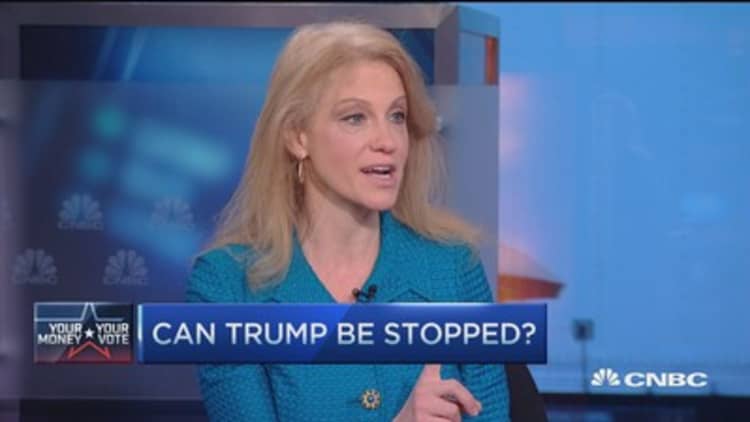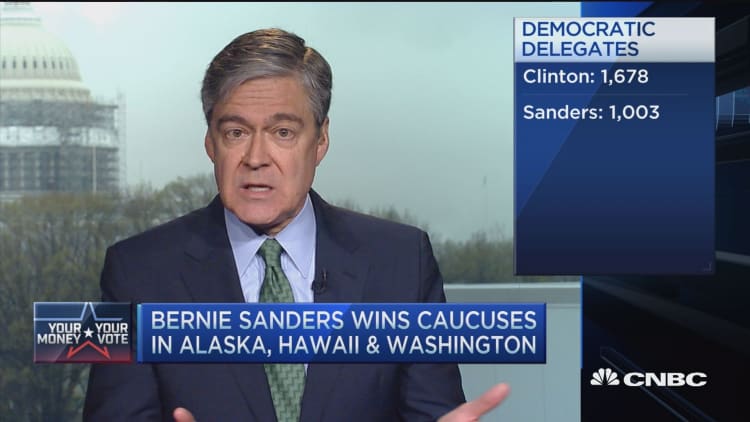



Donald Trump now faces two major hurdles to getting the Republican nomination for president. First, it appears he may fall short of the 1,237 delegates needed to lock down the nomination before the GOP convention in Cleveland in July. Second, if he does lack the delegates, his chief rival, Texas Sen. Ted Cruz, may outflank him on subsequent ballots.
On the delegate count front, Trump now has 739 to 465 for Cruz with 944 outstanding. So Trump needs to win 53 percent of the remaining delegates. But Trump is clearly losing momentum to Cruz.
In the critical winner-take-all Wisconsin primary on April 5, Cruz now has a 5-point lead over Trump, 36 percent to 31 percent, according to a late poll. Ohio Gov. John Kasich trails with 21 percent.
Cruz's lead would likely be much larger with Kasich out of the race. Trump's lead is also narrowing in many national polls, with the latest Fox News poll showing him leading Cruz by just 3 points, 41 percent to 38 percent, within the survey's margin of error. Kasich clocks in at 19 percent, suggesting that without the Ohio governor in the race, Cruz would likely be leading Trump, perhaps by a substantial margin.
Should Trump lose Wisconsin, he will likely bounce back with a big win in his home state of New York on April 19. But New York is not winner take all, so he will not necessarily claim all of the state's 95 delegates. From New York, the GOP race turns to winner-take-all contests in Delaware, Maryland and Pennsylvania on April 26 and proportional contests in Connecticut and Rhode Island.
If Trump can't dominate the winner-take-all states, it may become increasingly clear that he will head to Cleveland with fewer than 1,237 delegates, especially if Cruz can win California on June 7. Trump has a narrow lead in the state but it could easily go down to the wire.
The second problem for Trump is that if he lacks the requisite delegates, especially if he is a 100 or more short, he may have little to no path to win in Cleveland. The Cruz campaign has been actively courting actual delegates who are generally elected in local and statewide contests after a presidential primary or caucus. These delegates are pledged on the first ballot but can generally support any candidate on subsequent ballots.
So even in states that Trump won, like Louisiana, the actual delegates who go to Cleveland could essentially be sleeper agents for Cruz ready to move to the Texas senator in extended rounds of voting. The Trump camp is reportedly well behind Cruz in making sure they elect loyal delegates to the party convention. Trump has instead tried to use the bully pulpit to argue that even if he doesn't have enough delegates, he should get the nomination because he has the most and won the largest number of votes.
But the process does not work that way and was expressly set up to make sure that the eventual nominee is a consensus choice viewed as having the best shot at winning in November, rather than a plurality winner who failed to get over the finish line during the primary and caucus season.
There is also still a significant possibility that even Cruz will not be able to amass the necessary delegates after a couple of rounds of voting. That is when the break-glass-in-case-of-emergency scenarios begin and someone like Kasich or House Speaker Paul Ryan, who will preside over the convention, could emerge as the ultimate nominee. However it winds up, the challenges to Trump are clear. He needs to regain momentum and hit 1,237 before Cleveland or he could be headed back to Trump Tower for good.
— Ben White is Politico's chief economic correspondent and a CNBC contributor. He also authors the daily tip sheet Politico Morning Money [politico.com/morningmoney]. Follow him on Twitter @morningmoneyben.


